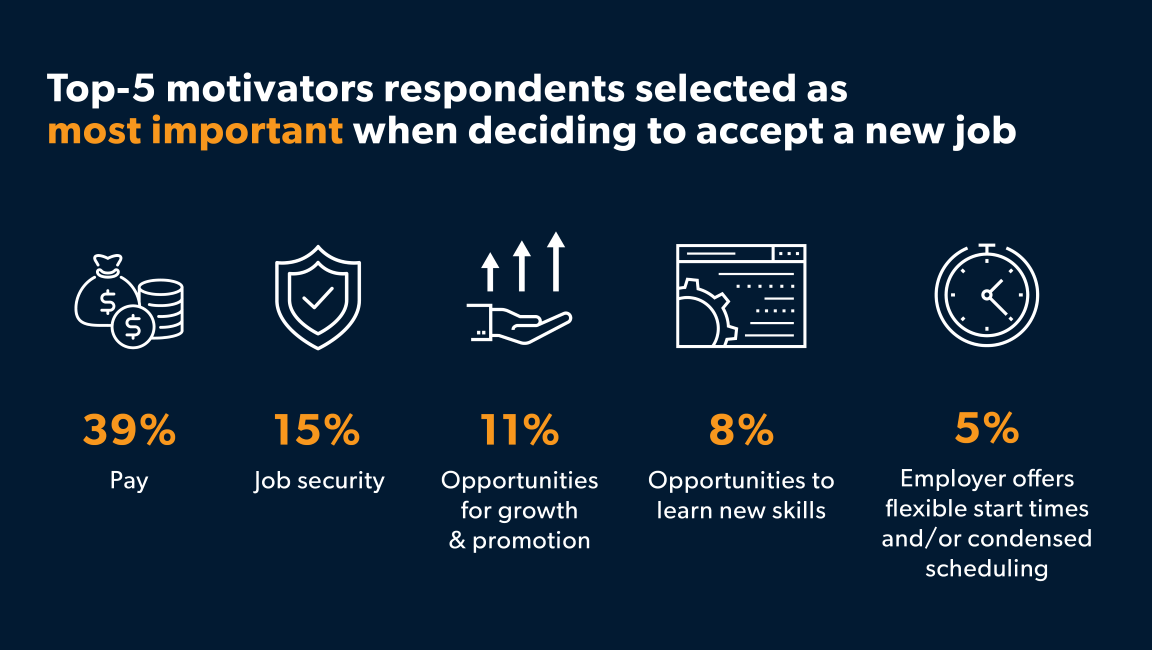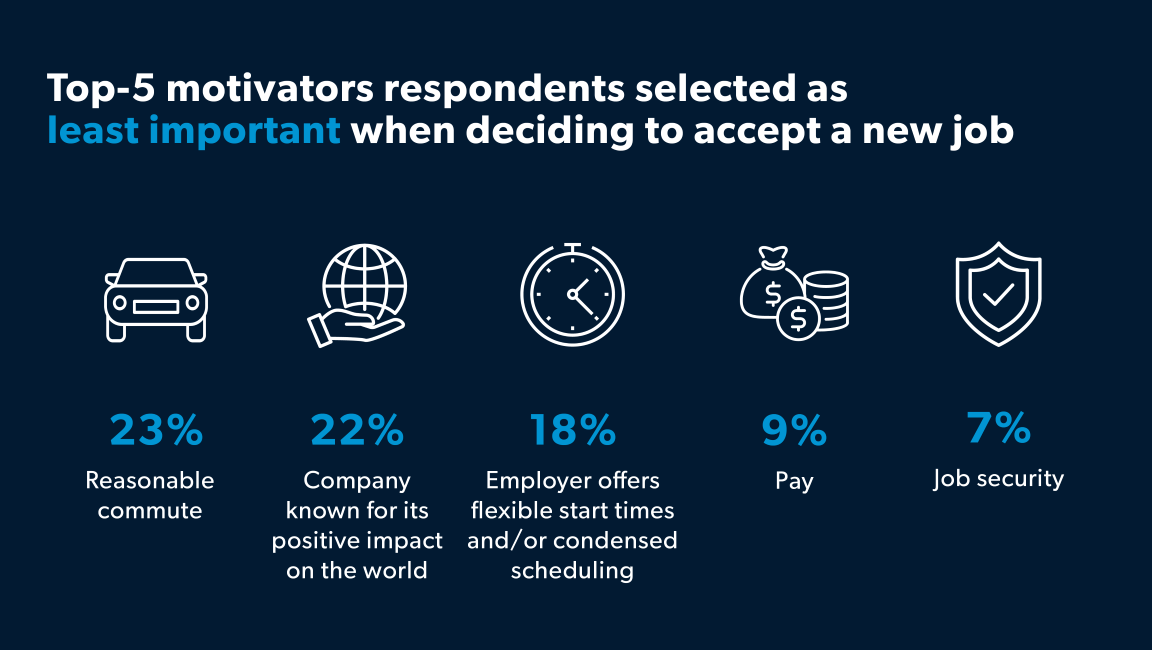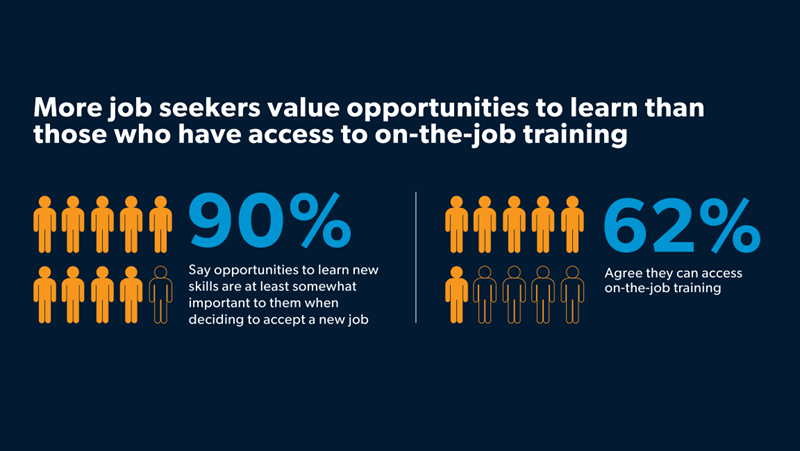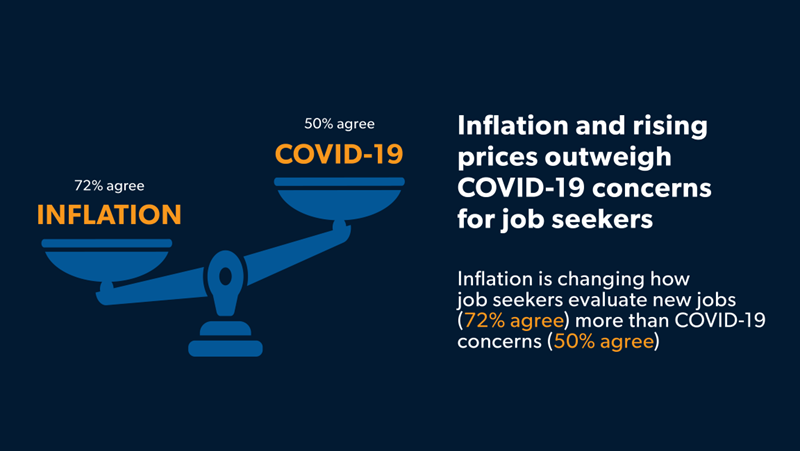Job-Seeker Survey: Q4 2022

2022 was a year that brought plenty of new opportunities for job seekers. With the amount of job openings outpacing the number of available workers, resignations and quits were at all-time highs. This allowed workers to demand more from their employers.
Through our Job-Seeker Survey for Q4 2022, we aimed to learn more about how the ongoing candidate’s market was impacting job seeker motivations.
Conducted as an independent online survey, the survey was completed by 1,051 job seekers who were applying for work in calendar year 2022 and seeking jobs in the sectors Aerotek serves including manufacturing, robotics and automation, facilities and maintenance, distribution and logistics, construction and other industries. Respondents were 18 years of age or older, located in the U.S. and completed the survey between Sept. 28 and Nov. 7, 2022.
The results confirmed some common beliefs while also delivering new insights into job seeker motivations.
As expected, pay was highlighted as the primary driver for those looking for new jobs. However, we learned that other benefits were nearly as important.
The job seekers of 2022 also highly valued opportunities to learn new skills and clear communications from their employers about performance and expectations.
Top Motivators for Job Seekers: Q4 2022
We asked 1,051 job seekers:
"How important or unimportant are the following factors when deciding to accept a new job?"
It was no shock that 92.3% of respondents said pay was at least somewhat important. But other motivators weren't far off in importance.
| Motivator | Percent who viewed motivator as at least somewhat important |
| Pay | 92.3% |
| Opportunities to learn new skills | 90.4% |
| Clear communication about your performance expectations | 89.6% |
| Company displays care for employee health & safety | 88.5% |
| Job security | 88.3% |
| Company has a good reputation as a quality employer | 87% |
| Opportunities for growth and promotion | 87% |
| Management/Supervisors that care about your career | 83% |
| Reasonable commute | 81% |
| Company is known for its positive impact on the world | 73% |
| Employer offers flexible start times and/or condensed scheduling | 72% |
Source: Aerotek Job Seeker Survey: Q4 2022
Most Important Motivators
When asked what factor among a list of 11 was most important when deciding to accept a new job, respondents labeled pay as number one. Job security and opportunities for growth & promotion were also highly popular as the most important motivators for job seekers.
Respondents also noted opportunities to learn new skills and flexible scheduling as important motivators. While not as important as pay, these are two areas employers can improve upon to attract more workers and better quality talent.
To learn more about the most important motivators to job seekers, click here.

Least Important Motivators
When asked what factor among a list of 11 was least important when deciding to accept a new job, respondents labeled a reasonable commute as number one.
Those surveyed aren’t currently motivated by jobs that are nearby. A company’s reputation for having a positive impact was also not seen as a leading consideration when deciding to accept a new job.

A Desire for Training
We also asked job seekers about their current or most recent employers, and how their situation compared to what they want out of a new job.
We found gaps between the opportunities workers want and what they currently have access to.
90% of respondents said opportunities to learn new skills was a factor that was at least somewhat important to them when deciding to accept a new job. Meanwhile, just 62% agreed they could access on-the-job training in their current or most recent role.

Inflation and Rising Prices outweigh COVID-19 Concerns
Workers continued to be concerned by the COVID-19 virus in 2022, but inflation is the more important factor when it comes to selecting a new job, according to job seekers.
72% of respondents agreed that inflation and rising prices were impacting how they evaluate new jobs, while just 50% agreed COVID-19 concerns were impacting their evaluation.


